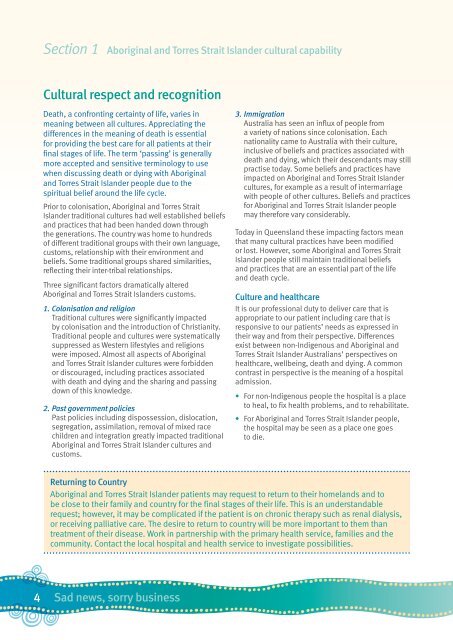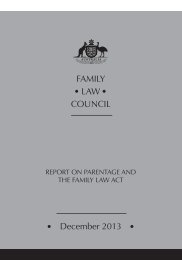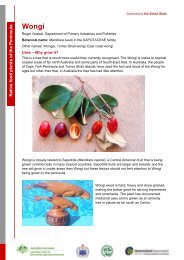sad news sorry business
84uyJtC1F
84uyJtC1F
You also want an ePaper? Increase the reach of your titles
YUMPU automatically turns print PDFs into web optimized ePapers that Google loves.
Section 1<br />
Aboriginal and Torres Strait Islander cultural capability<br />
Cultural respect and recognition<br />
Death, a confronting certainty of life, varies in<br />
meaning between all cultures. Appreciating the<br />
differences in the meaning of death is essential<br />
for providing the best care for all patients at their<br />
final stages of life. The term ‘passing’ is generally<br />
more accepted and sensitive terminology to use<br />
when discussing death or dying with Aboriginal<br />
and Torres Strait Islander people due to the<br />
spiritual belief around the life cycle.<br />
Prior to colonisation, Aboriginal and Torres Strait<br />
Islander traditional cultures had well established beliefs<br />
and practices that had been handed down through<br />
the generations. The country was home to hundreds<br />
of different traditional groups with their own language,<br />
customs, relationship with their environment and<br />
beliefs. Some traditional groups shared similarities,<br />
reflecting their inter-tribal relationships.<br />
Three significant factors dramatically altered<br />
Aboriginal and Torres Strait Islanders customs.<br />
1. Colonisation and religion<br />
Traditional cultures were significantly impacted<br />
by colonisation and the introduction of Christianity.<br />
Traditional people and cultures were systematically<br />
suppressed as Western lifestyles and religions<br />
were imposed. Almost all aspects of Aboriginal<br />
and Torres Strait Islander cultures were forbidden<br />
or discouraged, including practices associated<br />
with death and dying and the sharing and passing<br />
down of this knowledge.<br />
2. Past government policies<br />
Past policies including dispossession, dislocation,<br />
segregation, assimilation, removal of mixed race<br />
children and integration greatly impacted traditional<br />
Aboriginal and Torres Strait Islander cultures and<br />
customs.<br />
3. Immigration<br />
Australia has seen an influx of people from<br />
a variety of nations since colonisation. Each<br />
nationality came to Australia with their culture,<br />
inclusive of beliefs and practices associated with<br />
death and dying, which their descendants may still<br />
practise today. Some beliefs and practices have<br />
impacted on Aboriginal and Torres Strait Islander<br />
cultures, for example as a result of intermarriage<br />
with people of other cultures. Beliefs and practices<br />
for Aboriginal and Torres Strait Islander people<br />
may therefore vary considerably.<br />
Today in Queensland these impacting factors mean<br />
that many cultural practices have been modified<br />
or lost. However, some Aboriginal and Torres Strait<br />
Islander people still maintain traditional beliefs<br />
and practices that are an essential part of the life<br />
and death cycle.<br />
Culture and healthcare<br />
It is our professional duty to deliver care that is<br />
appropriate to our patient including care that is<br />
responsive to our patients’ needs as expressed in<br />
their way and from their perspective. Differences<br />
exist between non-Indigenous and Aboriginal and<br />
Torres Strait Islander Australians’ perspectives on<br />
healthcare, wellbeing, death and dying. A common<br />
contrast in perspective is the meaning of a hospital<br />
admission.<br />
• For non-Indigenous people the hospital is a place<br />
to heal, to fix health problems, and to rehabilitate.<br />
• For Aboriginal and Torres Strait Islander people,<br />
the hospital may be seen as a place one goes<br />
to die.<br />
Returning to Country<br />
Aboriginal and Torres Strait Islander patients may request to return to their homelands and to<br />
be close to their family and country for the final stages of their life. This is an understandable<br />
request; however, it may be complicated if the patient is on chronic therapy such as renal dialysis,<br />
or receiving palliative care. The desire to return to country will be more important to them than<br />
treatment of their disease. Work in partnership with the primary health service, families and the<br />
community. Contact the local hospital and health service to investigate possibilities.<br />
4 Sad <strong>news</strong>, <strong>sorry</strong> <strong>business</strong>




